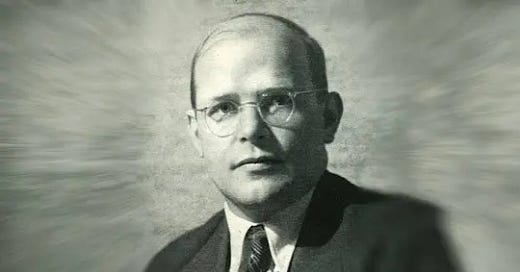More foreign affairs in a crazy, mixed up world
A personal plea to end the plague of public stupidity
I may lose a few readers and friends for this very personal posting. It will doubtless gain me no new ones, either. If so, sobeit. Go in peace, old friends. But as a historian, former diplomat, and onetime journalist, I feel I must say something while the mood is upon me.
A thoughtful friend of mine from childhood recently reminded me about the immortal words of Dietrich Bonhoeffer, a German pastor and theologian executed in prison by Adolf Hitler’s mindless Nazi puppets in 1945, just before the Allies overran Berlin. [See Dietrich Bonhoeffer’s Letters and Papers from Prison, published posthumously in 1951.]
After witnessing the total meltdown of our foreign policy unveiled by our self-aggrandizing “leaders” in the Oval Office on Friday—in a public display of nasty, childish petulance which would have gotten me a swift paddling and bed without supper as a five-year-old—I will first repeat what my friend wrote in his recent Facebook posting.
“What is Dietrich Bonhoeffer’s theory of stupidity?
Dietrich Bonhoeffer’s theory of stupidity is a thought-provoking idea he expressed in his writings, particularly in Letters and Papers from Prison. He argues that stupidity is a more dangerous enemy of good than outright evil because stupidity can be manipulated and used for destructive purposes without moral reflection. His key points include:
1. Stupidity is a social phenomenon — It’s not just about a lack of intelligence but arises in certain social and political conditions, especially under oppressive regimes or mass movements where people surrender independent thinking.
2. Stupid people are unaware of their own stupidity — Unlike malicious people, who act with intent, stupid people genuinely believe in what they’re doing and cannot be reasoned with. Their thinking is shaped by external influences, making them immune to logic.
3. Stupidity thrives in power dynamics — When people become part of a collective, especially under authoritarianism, they stop thinking critically. Instead, they adopt slogans and ideologies without questioning them.
4. Overcoming stupidity is difficult — Since it’s not based on intellect but on a willful surrender to groupthink, rational arguments rarely work against it. Change can only happen through personal transformation or societal shifts.
Bonhoeffer’s theory is especially relevant in discussions of propaganda, misinformation, and the dangers of blind conformity in politics and society. He ultimately suggests that resisting stupidity requires fostering personal responsibility and moral courage rather than just increasing intelligence or knowledge.
I’m just saying, is all …”
German theologian Dietrich Bonhoeffer (1906-1945). Public domain photo
I was a proud U.S. diplomat for a shade under 15 years, serving as a Foreign Service officer in seven countries under three successive presidents—Reagan, Bush, and Clinton—and as a trained professional, was accustomed from day one to hiding my own feelings whenever U.S. policy writ large differed from what I personally preferred. I knew I did not make policy. It was my job, like it or not, to help carry out their policy—and to smile at critics, and occasionally, to soothe ruffled feathers.
But it has suddenly become almost embarrassing for me to admit over the last month to my friends of other nationalities—Canadian, largely, but Caribbean and South American, as well—here in South Florida that I am even an American, when the people who should be leading us choose to indulge in such petty, vindictive, overheated and—yes, appallingly stupid—behavior before the whole world as we witnessed on Friday.
All for the sake of an impractical “deal” nobody really wants or even needs … just so another dictator can have his completely malevolent way and take over Ukraine’s land, while we “profit” from it. Our current foreign policy is now “a tale told by an idiot, full of sound and fury, signifying nothing,” as Shakespeare’s doomed Macbeth put it. Suddenly treating our allies, neighbors, and friends as if they are the enemies … and our sworn enemies, who would gladly crush us if they could, as if they are the only people worth consorting with …
No, I will not stand idly by and say nothing when a real world leader who deserves only praise for his personal courage and unblinking candor—who has risked his life for three years to save his beleaguered people in an unnecessary war waged by a ruthless, crazed dictator—is shamelessly and publicly berated for not genuflecting before Vladimir Putin’s ardent defender. Here is a man who has never done anything brave in his entire misbegotten life. A boorish bully who cannot tolerate anything but sycophantic butt-kissing from the incompetents he has surrounded himself with, and fires anyone who dares to color outside the lines in the simple-minded coloring book he has decreed.
Or his understudy, the blockheaded bulldog mini-me who started the whole Friday fracas in a crazed lust for the spotlight before going skiing for the weekend. Or his gutless wonder at the State Department, who managed only to stammer something agreeably inane, like “Yes sir, dear leader, how high should I jump?” Or his former colleague, the all-but-senile senior Senator from South Carolina, who quickly showed his own butt in squealing a silly pig-like chorus to the Alice in Wonderland-like chant, “off with his head.”
All three used to oppose such nonsense, along with its architect … until they didn’t. A coterie now of chattering chipmunks and cartoonish buffoons, pretenders to the throne, in my humble opinion. All now ruthlessly stupid, and all apparently proud to be recognized as such.
But stupid is always as stupid does, relentlessly. The gifted if unpopular German-American philosopher Hannah Arendt wrote 60 years ago about what she called “the banality of evil,” after Nazi war criminal Adolf Eichmann was tried and executed for his complicity in Hitler’s horrors. [See her controversial Eichmann in Jerusalem: The Banality of Evil, published in 1963.]
Hannah Arendt (1906-1975), uncompromising German-American philosopher. Public domain photo
I do not pretend to aspire to her level of perception—which drew her, I might add, some muted praise, along with death threats and an almost irrational angry backlash for indirectly accusing her fellow Jews of not doing enough to stop Hitler—but I remind readers of her personal courage in the face of the wave of condemnation she unleashed.
Arendt had escaped an almost certain death herself only by fleeing Germany after being freed from detention in 1933, and had condemned totalitarianism for 30 years before Eichmann’s trial. But this was something new. It was about the facilitators of tyrants, the co-conspirators. Hitler himself, always the coward, committed suicide rather than face his accusers, three weeks after ordering Bonhoeffer’s execution.
The Fuehrer’s underlings, like Eichmann, didn’t get the memo. So they pretended they were only following orders, that they had no choice. Sound familiar?
War criminal Adolf Eichmann, at his 1961 trial in Jerusalem. Photo courtesy U.S. Holocaust Museum
According to writer Kathleen Jones, among the more disturbing conclusions Arendt reached in 1963 were those about the defendant himself [see “The Trial of Hannah Arendt,”https://www.neh.gov/humanities/2014/marchapril/feature/the-trial-hannah-arendt ]:
“Despite all the efforts of the prosecution, everybody could see that this man was not a ‘monster,’ but it was difficult indeed not to suspect that he was a clown.” He [Eichmann] was not the incarnation of evil, she wrote; he was “thoughtless,” unable to reflect on the fact that what he was doing was wrong.
“The longer one listened to him, the more obvious it became that his inability to speak [in anything but clichés] was closely connected with an inability to think, namely, to think from the standpoint of somebody else.”
I am of the opinion that Arendt might easily have been predicting the silly spectacle we witnessed the latest episode of on Friday, and from which I am still reeling. I do not know what else Arendt might have to say about the world we now live in—to the tyrants and would-be tyrants, or to their admirers, alike—or about the increasingly authoritarian tone adopted by the clowns and dolts we world citizens keep elevating and re-elevating, almost farcically, to leadership.
Self-important “strong men” with greedy appetites, weak minds, and no souls … men you would not even want to have over to dinner … and might cross the street to avoid meeting them on a sidewalk … or their thuggish supporters, the kind of folks who inhabit dark alleys and victimize anyone who comes near.
It is not just here in America, but around the world—in Belarus, Hungary, Iran, North Korea, the Philippines, Russia, Suriname, and Turkey, to name just a few recent examples—or infinitely more sadly, even in Israel itself. Can Western Europe be far behind? Germany and France have recently dodged the same bullet, if just barely—and probably not for the last time. Who knows who will be next in line for the curse …
But what I do know is that Hannah Arendt would point an accusing finger at everyone—Jewish or Christian—who stands by now and says nothing, and allows it to go unchallenged, hoping against hope it will go away. As a devout Christian, I must follow suit. I have no choice now.
As Dietrich Bonhoeffer, in sight of his own gallows, so bravely put it 80 years ago, the choice is ours, and we can blame no one else for allowing evil to triumph. “Silence in the face of evil is itself evil: God will not hold us guiltless. Not to speak is to speak. Not to act is to act.”
Next time: More foreign affairs in a crazy, mixed-up world







Holly, I hope we can make our voices heard. If it not too late already... we must try.
Thank you for reading--and responding. Hope all is well in NC--my old bridge-playing buddy Rich Beckman is getting inducted into the Journalism Hall of Fame in April, and I'm trying to figure how out to get up there to see him. Hate to fly but maybe this once... Best, Ben
This is a clear and demanding read -- thank you, Ben, for your faithfulness and for this post.